by: Mirjam Visser, 2012-06-30 14:03:32 UTC
Sustainability Aspects: Their words: "We are building interest and appeal in renewable materials through our original designs and material innovations, and through our own imaginations. We strive to lessen the impact we place on the planet’s limited natural resources. And take
The Story
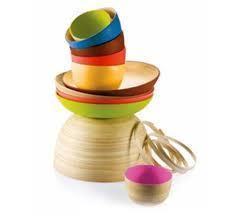
bambu is a renewable ideas company. Building interest and appeal in renewable materials through original designs and material innovations, and through imagination. Striving lessen the impact on the planet’s limited natural resources. And take a socially responsible approach to their products, processes and practices.
Sustainable materials
- Bamboo:Bamboo is a highly renewable material. It is one of the earth’s fastest growing plants. Bamboo needs no replanting, grows without fertilizers or pesticides and is harvested from controlled stands with an astounding growth cycle of three to five years. Bamboo truly is a remarkable renewable resource. It is a centuries old material that has been and continues to be used by over half the world’s population for applications as varied as food, shelter, fuel and clothing. These applications make bamboo a vital non-timber, non-petroleum resource. With a tensile strength superior to steel, it is one of the most versatile and durable natural resources in the world.
- Cork: Cork is another remarkable renewable natural resource. The cork is sourced from the Qin Ling Mountains of Northern China. It is harvested sustainably every 10 to 12 years from the Cork Oak tree. Cork provides a valuable source of income to thousands of people. The harvesting of cork does not harm the tree and the outer bark quickly regenerates and the tree continues to flourish, generally improving the trees health and vitality during its average 150-200 year lifespan. The tree plays a vital role in balancing an ecosystem. Cork forests are essential to preventing soil erosion, maintaining water resources and storing CO2. Contrary to common perception, cork is in abundant supply.
- Coconut; Coconuts are an abundant renewable resource grown throughout the tropics for decoration as well as for its many culinary and non-culinary uses; virtually every part of the coconut palm has some application, including the coconut shell, a waste by-product. It is obtained in Southern Vietnam, harvested for its meat and for its milk. The shells are often tossed or burned. Bambu reclaims the shells and then follow a laborious process to prepare them.
Certified Organic
And because the speed bamboo growns in it can be draining the soil from nutrients if not harvested in a sustainable way. The Bambu products are made only from bamboo that is sustainably harvested and free of fertilizers or pesticides. Offering, at the moment, the only bamboo products made from Certified Organic bamboo sources. And naturally, they use only water-based formaldehyde-free adhesives.
Fair Trade Practices
Their manufacturing partners must meet requirements for quality craftsmanship, environmental protection, and acceptable labor practices. Independent auditing firms inspect their manufacturers for worker health and safety and for environmental protection.
They have been granted the Green America Seal of Approval for the commitments Bambu has made toward fair treatment of workers, promoting healthy communities, preserving the environment and providing quality products.
Proudly Made
A job well done. A basket weaver from Northern Vietnam, a carpenter from rural China, or the production team in Shanghai all share a sense of pride in producing the products, and producing them well. You can appreciate the pride in the craftsmanship of the coiled bowls, or the finish of the cutting boards, or the attention to detail in the design of the kitchen tools. Pride in giving back to the local community, pride in supporting local artisans and small rural industry, and pride in using a renewable and plentiful resource.
At The Source
They are regularly on site and in the villages where the craftspeople work and live. This means Bambu is accountable for the integrity of their products and production processes. Because of their being on the ground and not working with agents or trading companies or middlemen, they can control what is happening in their sphere of control
The Products
Last but certainly not least; the bamboo bowls and kitchenware looks and stays beautiful! They are made with great craftsmanship and sense for detail.
Product: Kitchenware from renewable material
Designer: Bambu
Manufacturer: Bambu
Category: Kitchenware
Websites: bambuhome.com/
Images
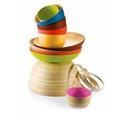
The bowls
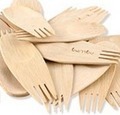
Spork Bambu
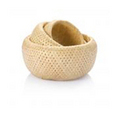
woven basket
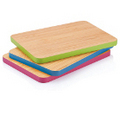
Cutting edge boards

The bowls
by Bambu

Comments by our Users
Be the first to write a comment for this item.